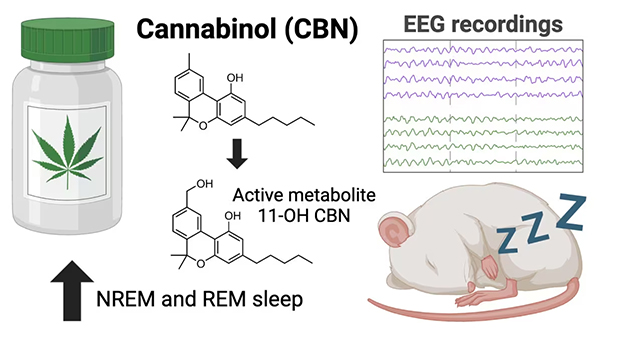Cannabis Really Can Induce Sleep, And Now We Know Why
Scientists have confirmed the cannabis ingredient cannabinol (CBN) can increase sleep in rats, highlighting a new path for future sleep treatments in humans.
Researchers from the University of Sydney found a break-down product of the compound extends periods of both non-rapid eye movement (NREM) and rapid eye movement (REM) sleep in rats, comparable to the effects of a popular sleep aid.
Both stages of sleep are critical in maintaining physical and mental health. REM, also considered the dream stage, helps with processing emotions, while non-REM sleep is associated with essential body repairs.
While purified CBN products are sold as a sleep medication in the US, robust evidence backing up its restful benefits had been lacking until now. The study's results set the foundation for future research into how the compound could help treat sleep disorders.

"For decades, cannabis folklore has suggested that aged cannabis makes consumers sleepy via the build-up of CBN," says pharmacologist Jonathon Arnold.
"Our study provides the first objective evidence that CBN increases sleep, at least in rats, by modifying the architecture of sleep in a beneficial way."
The main psychoactive element in cannabis, delta9-tetrahydrocannabinol or THC, slowly forms CBN in the plant when exposed to heat, oxygen, and light.
While THC has an intoxicating effect on the brain's CB1 cannabinoid receptors, the influence of CBN was far weaker, the researchers found.
In fact, through a closer look at brain activity, the team discovered that the metabolite 11-hydroxy-CBN – produced by the breakdown of CBN in the animals – has a stronger effect on the CB1 cannabinoid receptors than CBN itself.
Given the importance of these brain receptors in managing sleep, it's likely CBN's metabolites may have a more significant influence on sleep than than CBN itself.
"It was a surprise that CBN metabolism in the body can yield a much greater effect on cannabinoid CB1 receptors than the parent molecule CBN, which has much more limited activity," says Arnold.
Medications containing CBN might aid sleep with relatively few side effects on other parts of the brain, though this possibility still needs to be investigated. Human clinical trials are already underway in patients with insomnia.
"At this stage our results are confined to testing in rats," says Arnold. "Further research is needed to see if this translates to humans."
"Our research encourages further basic and clinical research on CBN as a new treatment strategy for sleep disorders, including insomnia."
The research has been published in Neuropsychopharmacology.



